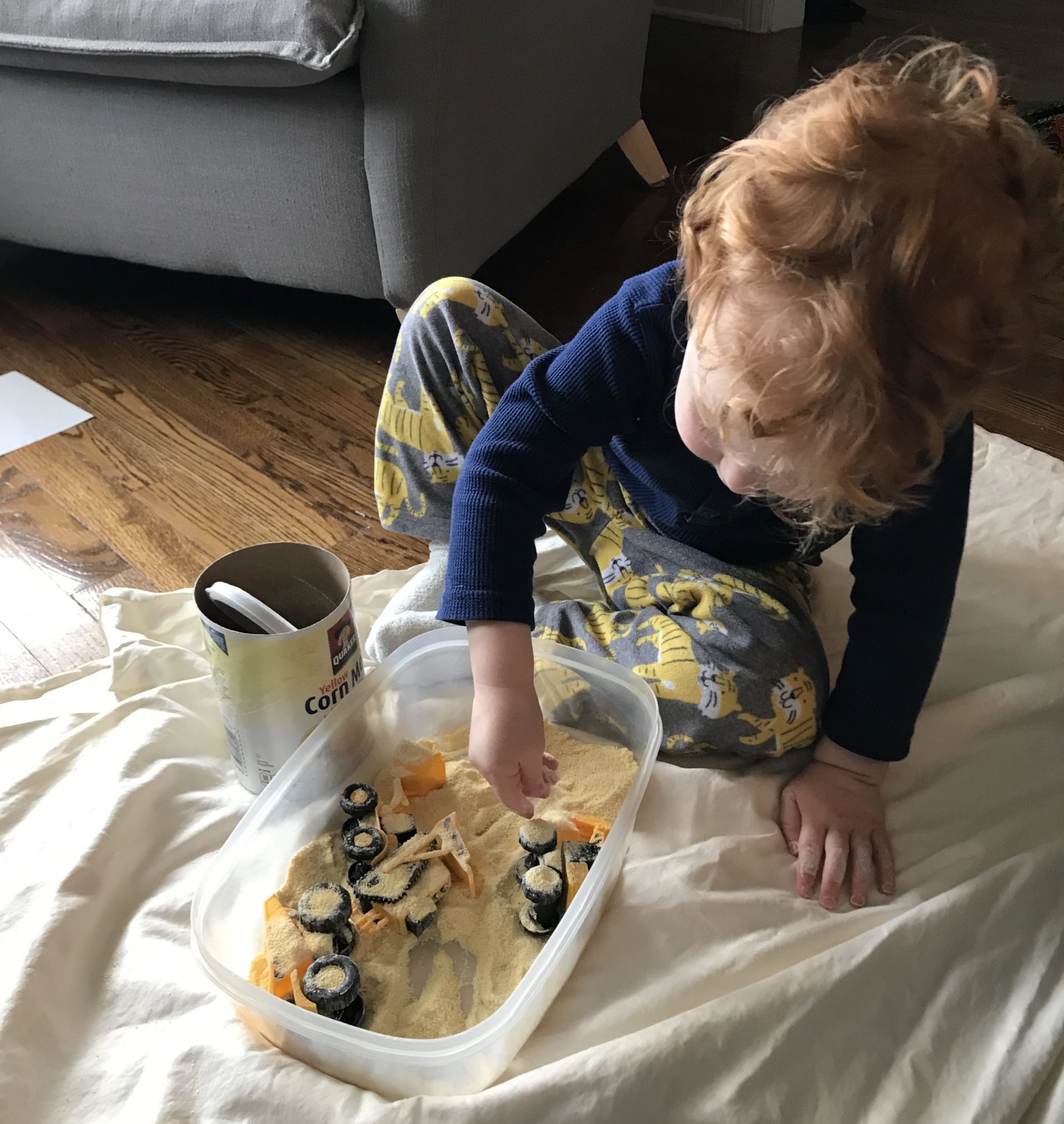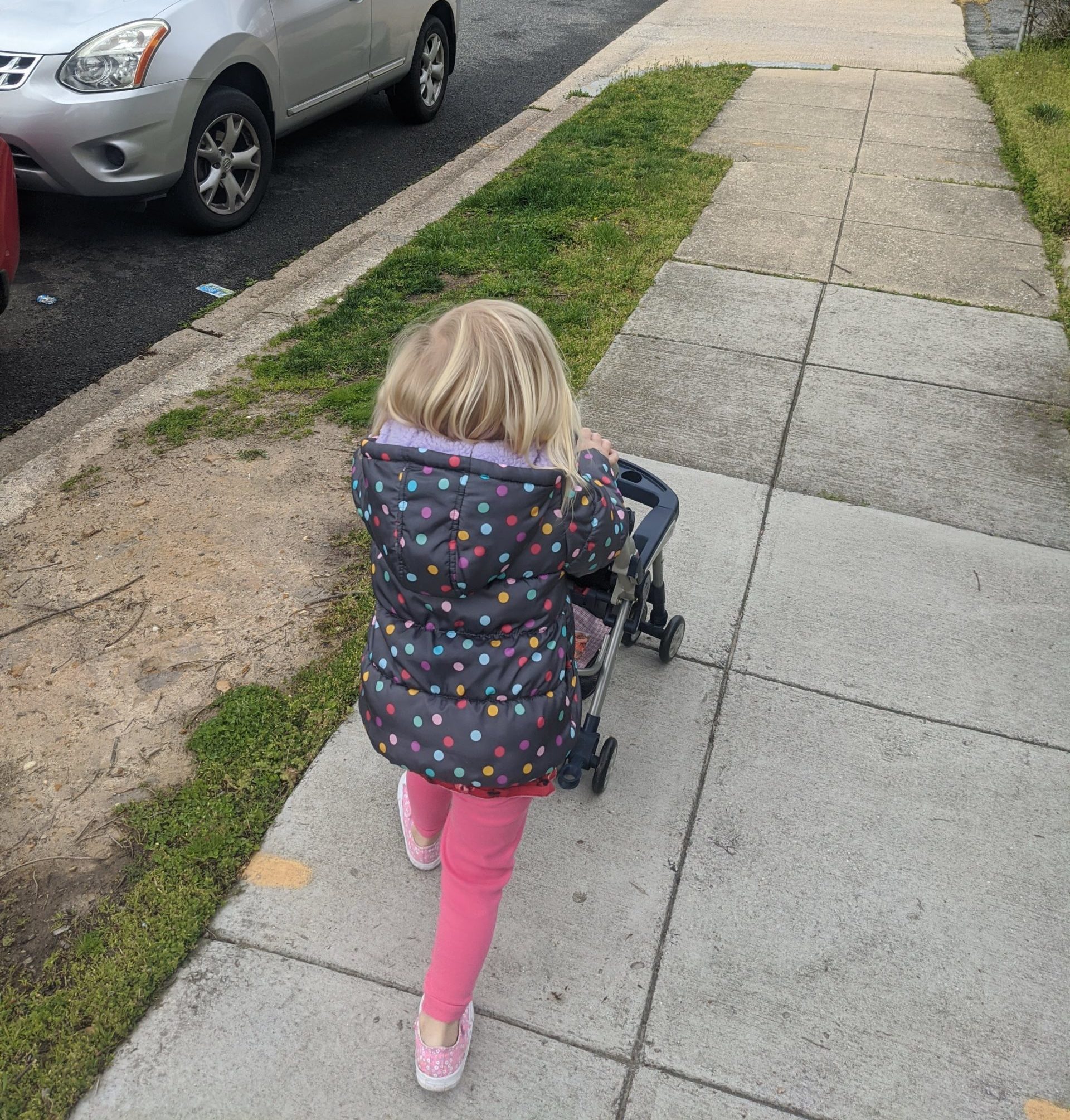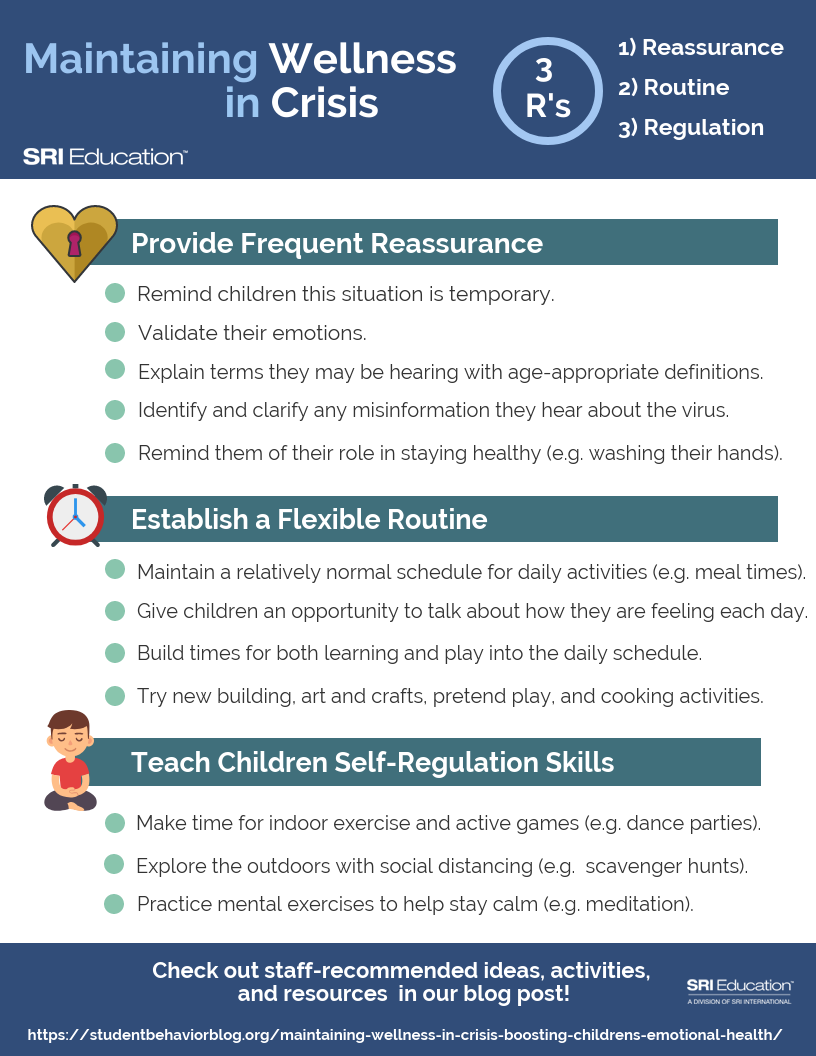Measures taken to address the spread of COVID-19, from precautionary social distancing to shelter-in-place orders, have dramatically impacted children and their families. In addition to navigating their own stress during a period of uncertainty and change, parents are faced with addressing the questions and concerns of their children, many of whom are spending significant amounts of time at home due to daycare and school closures.
Helping kids stay busy, stimulated, and positive while creating an environment that allows them to feel safe and protected can be challenging. A team of child trauma experts at Child Trends have listed several recommendations for supporting the emotional well-being of children during high stress periods. They highlight “3 R’s” for parents to use as guidelines for maintaining structure in the household: Reassurance, Routines, and Regulation.
We have provided some examples of activities and resources parents can use to implement the 3 R’s into their own home to keep their children’s activity levels high and stress levels low!
Provide Frequent Reassurance
Children at all ages are quick to pick up on stressors in their environment, and it is difficult for parents to completely prevent this. Parents can use resources on our blog’s COVID-19 resources page to talk to their child about COVID-19 in a developmentally appropriate way. In addition, there are strategies that parents can use to alleviate the negative emotions that children are experiencing, which can also help reduce their own stress levels.
- Remind children that this situation is temporary.
- Validate their emotions–See Greater Good Magazine’s article on Emotion Coaching for steps to validate children’s emotions.
- Explain terms they may be hearing frequently with age-appropriate definitions (quarantine, isolate, social distancing) and answer any questions.
- Identify and clarify any misinformation they might hear.
- Remind them of their important role in staying healthy. Some important basics to cover are:
- Wash hands often. This PBS KIDS Daniel Tiger clip demonstrates good hand-washing practices for young kids!
- Cover mouth when coughing/sneezing.
- Practice social distancing.
Establish a Routine: Structure & Flexibility
Parents and children will likely have deviations from their usual schedule during this time. Parents should establish structure for basic daily activities like sleep, nutrition, and hygiene to give children a sense of security and predictability. For example, one of our staff members, Dan, uses nightly dinner time as an opportunity for his children to describe one good, one new, and one bad/difficult thing that happened to them that day.
While parents can build times for learning and play into the daily schedule, they can also try to use this opportunity to show kids how to be flexible in adjusting their daily tasks and activities. There is plenty of room for creativity while filling the day with learning activities, pretend play, and crafts. Here are some helpful ideas and resources, some of which have worked well for the children of our staff!
Crafts & Pretend Play
- Collect toilet paper and paper towel rolls, empty milk cartons, and cardboard boxes. Use tape, glue, stickers, paint, and string to build exciting structures like forts, construction sites, and train stations! Little Bins for Little Hands lists some very creative ideas to get started.
- Teach games like grocery store, kitchen, and house. Assign older children roles like cashier, customer, and chef to get them involved.
- Do a daily art project by tuning into the Kennedy Center’s Lunch Doodles with Mo Willems.
Baking & Cooking
Try to involve children, even young ones, in as much of the cooking process as possible, such as measuring ingredients or pouring in the bowl. Make fun chef hats or aprons! Show older children how yeast works, ask them to help add ½ cup plus ¼ cup, crack an egg, or make up a creative recipe.
- Enjoy kid-inspired recipes, activities, and kitchen trivia in America’s Test Kitchen – Recommended by our own staff member, Jen, whose three children love this resource!
- Another idea for younger kids: Throw family, toys, or stuffed animals a tea party – real or pretend.

Our staff member Sarah’s son Jack (aged 2.5) playing with his own texture table.
Create a DIY Texture Table (great for kids ages 2 to 5)
- Fill a large Tupperware bin with water, sand, rice, or cornmeal, and load it up with trucks, trains, toy animals, and rocks. Help them find out which items float and which sink, or if they can bury them all.
- For parents who are okay with a little mess, here is an easy 3-ingredient recipe for homemade slime.
Teach Self-Regulation
Like adults, children can experience reductions in their stress by incorporating both physically and mentally stimulating activities into their daily routines. However, they will likely need some guidance learning how to self-regulate – and we’ve come up with some ideas for parents to help them do that!
Physical Exercise Play
Exercise is beneficial at any age, as it creates boosts in energy, mental health, and cognitive abilities. Try out one or more of these activities:

Our staff member Steph’s 3-year-old daughter Vivian taking a stroll.
- Take a walk outside around the neighborhood–while practicing social distancing.
Do a scavenger hunt in the backyard or inside. - Search for bugs & worms, or even making a house for them from nature.
Act out favorite storybooks. - Play hide & seek.
- Have a dance or karaoke party.
- Check out this At Home Activity Guide for other ideas!
Mindful & Mental Exercises
Meditation can be modified to meet any age range, and doctors from the American Academy of Pediatrics highlight the importance of meditation breaks for kids. Here are some great resources used by our own staff that other kids might like too!
- Cosmic Kids Yoga – Recommended by our staff member, Steph, who has a three-year-old at home.
- Go Noodle: “Melting” Video – Recommended by several staff members with kids at home.
- Peace Out Podcast – Calming short stories to help elementary and middle school aged children relax their mind and body.
- Free audiobooks from Audible – Great for children to listen to while taking a relaxation break. Also a perfect way for parents to keep their children occupied while taking a few minutes for themselves.

Topics: Early childhood Elementary school Mental health Social-emotional learning
Tags: COVID-19 K-3/early elementary Prekindergarten/preschool SEL
